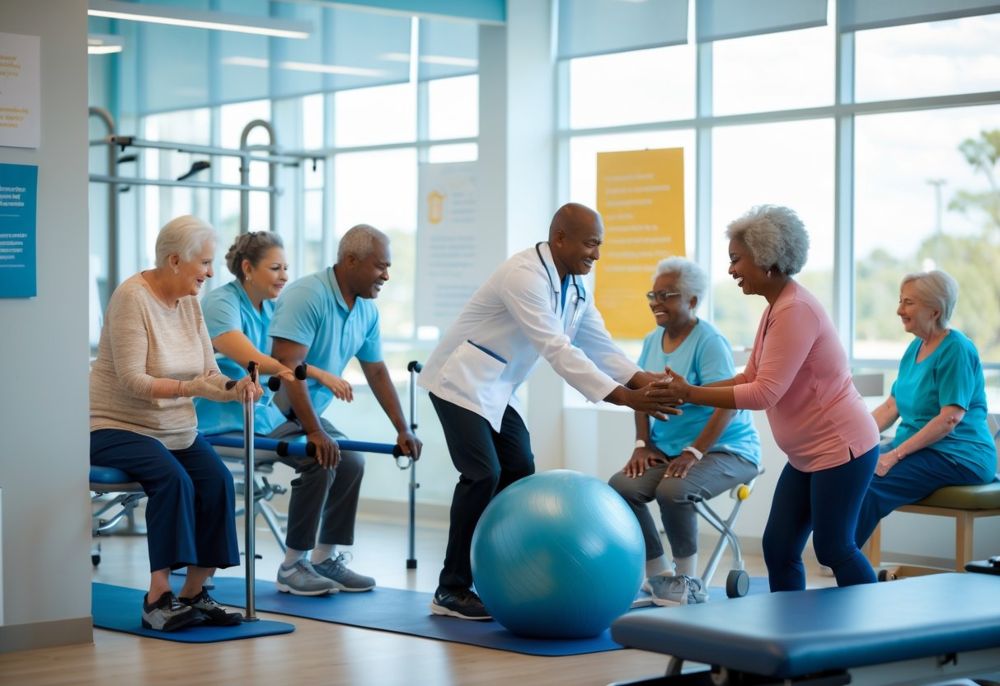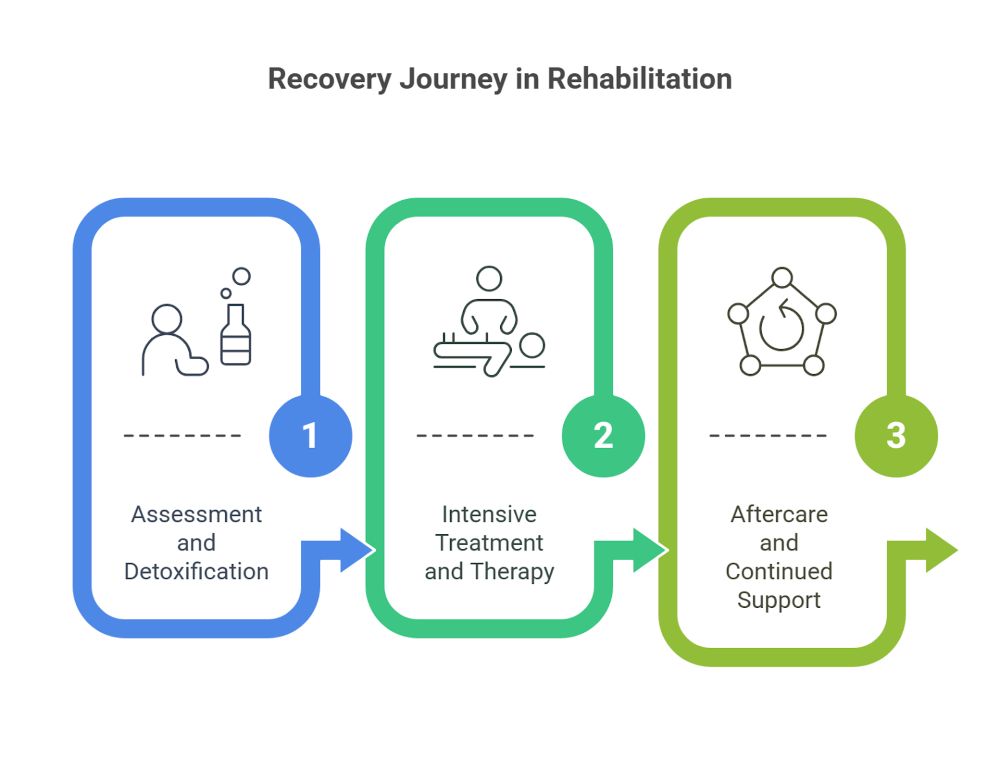The Recovery Journey: What to Expect During Rehabilitation Treatment in Atlanta
Originally published: June 2025 | Updated: July 2025 | Reviewed by Sadie Mays
Originally published: June 2025 | Updated: July 2025 | Reviewed by Sadie Mays

Starting the journey toward recovery from addiction in Atlanta can feel overwhelming, especially for those who don’t know what to expect.
Rehabilitation treatment helps individuals regain control of their lives by providing support, guidance, and proven steps to initiate and sustain healing.
Each person’s experience is unique, but knowing what happens during rehab can ease worries and help people feel more prepared.
Rehabilitation programs in Atlanta encompass various stages, including assessments, therapy, and aftercare planning, all designed to help individuals achieve lasting recovery.
Supportive professionals work closely with each individual to address their specific needs and help them overcome challenges they may encounter along the way.
Learning what happens in a rehab center can give hope and clarity as people move forward with their recovery.

Rehabilitation treatment helps individuals address problems like alcohol addiction or alcohol abuse.
In Atlanta, these programs provide a supportive environment and experienced care teams to guide each individual at the start of their recovery journey.
Rehabilitation treatment is a structured process designed to help people recover from substance use, including alcohol addiction and alcohol abuse.
It often starts with an initial assessment, where professionals check physical health, mental state, and substance use history.
Treatment programs may include detoxification (removing alcohol from the body), individual counseling, group therapy, and support for mental health issues.
Every plan is tailored to meet the individual’s needs.
Families may also join in special sessions to support their loved one.
The main goals are to help each person stop using harmful substances, learn healthy coping skills, and build a new routine.
Progress is tracked by regular check-ins and updates to the treatment plan, helping to keep recovery on track.
Atlanta offers many reputable rehab centers with specialized help for alcohol addiction and alcohol abuse.
These centers have skilled staff, including doctors, nurses, and counselors, who work together to support recovery.
Programs in Atlanta focus on individual needs and often provide access to both medical and mental health care.
The city’s rehab centers also offer aftercare support, such as outpatient therapy and community groups, which helps people stay sober after leaving treatment.
Being close to home in Atlanta means family can easily visit or join therapy sessions, which is known to improve outcomes.
Many local centers take a holistic approach, treating the whole person, not just the addiction.
Sadie G. Mays Health & Rehabilitation Center offers compassionate, skilled nursing care designed to support your recovery journey from the very beginning. Learn how their team can assist you—contact us today to get started.
If you’re ready to get started, call us now!

Recovery from addiction in Atlanta moves through several clear stages.
Each stage has a distinct focus and type of care, ranging from initial evaluation to ongoing support after discharge from the facility.
All successful rehabilitation begins with a careful assessment.
Medical professionals review a person’s medical history and current health status to develop a personalized plan that meets their unique needs.
This means learning about substance use, physical health, mental health, and any pressing safety concerns.
Detoxification is often the next necessary step.
Detox helps the body clear itself of harmful substances like drugs or alcohol, sometimes with medication to manage withdrawal symptoms.
This process is usually supervised by medical staff for both comfort and safety.
Detox can take several days and may bring both physical and emotional discomfort.
Close monitoring and compassionate care during this stage can help lower risks and make people feel safer as they begin their recovery journey.
By the end of this stage, most individuals are ready to embark on deeper healing and treatment.
Once the body is stable, the main focus is therapy and skill-building.
This stage often involves daily group or individual counseling sessions designed to address the underlying causes of addiction.
For those in alcohol rehab, therapies might include cognitive-behavioral therapy, motivational interviewing, and family support.
Medication can play a role for some people, especially if cravings or mental health issues are present.
The treatment team helps develop coping skills and relapse prevention strategies, making sure each person builds a support network.
Routine and structure are important.
Many centers require patients to adhere to a daily schedule, which typically includes therapy, medical check-ins, meals, activities, and quiet time.
Accountability during this stage supports progress and builds healthy routines for life after rehab.
Recovery doesn’t stop after leaving the residential facility.
Aftercare programs are designed to support lasting change by connecting individuals with ongoing counseling, support groups, medical services, and even employment help.
Many people choose support groups like Alcoholics Anonymous or group therapy for regular encouragement.
Personalized aftercare might include outpatient therapy, sober living arrangements, or even check-ins with a case manager.
Staying connected helps prevent relapse and supports emotional well-being.
Access to trusted resources and a strong community are key in this phase.
Knowing where to turn during stressful times helps a person in Atlanta face life’s challenges without returning to old habits, supporting a long-term healthy lifestyle.
If you’re considering short-term rehabilitation, Sadie G. Mays provides personalized therapy programs to help you regain strength and independence. Discover how their rehabilitation services can benefit you—schedule a consultation now.
If you’re ready to get started, call us now!
Recovery treatment can be physically and emotionally uncomfortable.
Many people face inner struggles, mood changes, and difficulties asking others for help as they work toward long-term recovery.
Withdrawal can include both physical and emotional symptoms. Physical symptoms may include headaches, shaking, sweating, and sleep disturbances.
Emotional symptoms can include anxiety, sadness, and sudden mood swings. These reactions often begin soon after stopping substance use.
To make withdrawal easier, doctors and nurses may offer medications, counseling, and a steady routine.
Staying hydrated, eating a balanced diet, and getting enough rest are also essential for healing.
It is normal for emotions to feel intense or uncomfortable. Support from medical teams and loved ones helps make the process safer and more manageable.
Experiencing emotional strain, such as frustration or depression, is common.
Some people benefit from attending a support group or talking to a mental health counselor, which can help address the emotional challenges of the process.
Mental barriers often manifest as denial, a fear of change, or low self-confidence. These thoughts can prevent someone from fully joining in their treatment plan.
Some days, they may want to quit or feel like progress is impossible. Recognizing these thoughts early can help.
Writing down reasons for change or keeping a daily journal may build motivation.
Setting realistic goals, like attending all therapy sessions for a week, also helps with progress.
When motivation wanes, discussing with therapists or trusted peers provides encouragement and fresh ideas.
Celebrating small successes helps build confidence over time. Accepting that change is slow can keep someone from feeling discouraged.
Having others to lean on makes recovery safer and less lonely. Support can come from family, friends, counselors, or recovery groups.
Individuals with strong support are more likely to achieve long-term recovery.
Ways to build a support network include:
An active support network makes it easier to manage cravings, handle stress, and celebrate progress.
For specific challenges, peer support groups and professional counselors can provide practical guidance and emotional advice.
Rehabilitation in Atlanta provides individuals with the support, structure, and professional care necessary at every stage of recovery.
Each person’s journey is unique, but the focus remains on growth and healing. Many find comfort in meeting others facing similar challenges.
The peer community helps many feel less alone and more supported.
Family members and friends also play a key role. Their encouragement and patience can make a real difference.
Atlanta rehab centers emphasize compassionate care and evidence-based treatments.
For compassionate long-term care tailored to your unique needs, Sadie G. Mays Health & Rehabilitation Center is here to help every step of the way. Contact us to discuss your care options today.
If you’re ready to get started, call us now!
What types of addiction rehabilitation treatments are available in Atlanta?
Addiction rehabilitation treatments in Atlanta include inpatient programs, outpatient services, medically supervised detox, therapy (individual and group), and medication-assisted treatment tailored to individual needs.
How long does rehabilitation treatment typically last in Atlanta?
Rehabilitation treatment duration varies by program and individual needs but typically ranges from 30 to 90 days, with some programs offering extended care for long-term recovery.
What should I expect during the detox process in Atlanta rehab centers?
During detox, patients undergo medical supervision to safely manage withdrawal symptoms, including physical monitoring and medication support to ease discomfort.
How do Atlanta rehab centers support mental health alongside addiction treatment?
Atlanta rehab centers integrate mental health services by providing dual diagnosis treatment, addressing co-occurring disorders through therapy and psychiatric care.
What are the available aftercare options after completing rehab in Atlanta?
Aftercare options include outpatient counseling, support groups, relapse prevention programs, and ongoing medical supervision to maintain long-term sobriety.